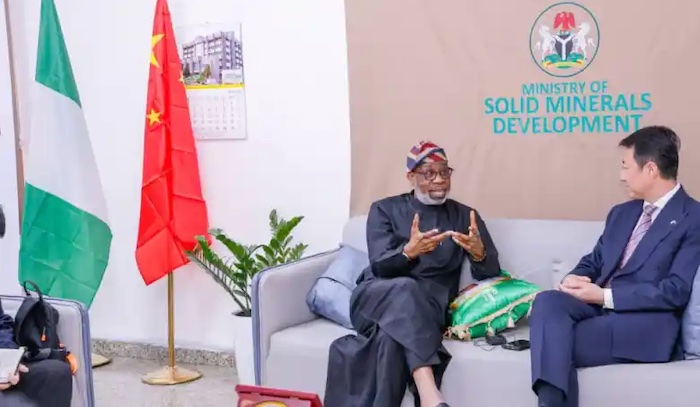Chinese companies are rapidly securing strategic positions across Nigeria’s clean energy and electric vehicle (EV) value chain, aiming to shape the future of mobility in Africa’s most populous nation. This year, two lithium processing plants — a critical component for EV battery production — are set to launch in Nigeria, both funded predominantly by Chinese investors.
Leading the charge is Jiuling Lithium Mining Company, currently constructing a $600 million facility on the border of Kaduna and Niger states, with production scheduled to begin this quarter. Not far behind is Canmax Technologies, which is investing $200 million in a lithium processing plant in Nasarawa State, just outside Abuja, expected to start operations in the third quarter.
Chinese firms are majority stakeholders in these ventures, financing over 80% of the projects, while local investors hold minority shares.
The Power Players Behind the Investments
Established in 2011, Jiuling has evolved into a global supplier of lithium salts, essential for EV batteries. Its clientele includes major international brands like Tesla and China’s BYD Group, the world’s largest EV manufacturer.
Canmax Technologies, originally a battery materials supplier since 1997, has pivoted decisively toward lithium processing in recent years. With several other plants in development, Chinese investments in Nigeria’s lithium sector have reached an estimated $1.3 billion, according to Nigeria’s Ministry of Solid Minerals.
Joining these ventures is Ganfeng Lithium Industry, a Chinese-owned company that launched a $250 million processing plant in Nasarawa State last year. The growing sector also includes Jupiter Lithium, a UK firm that discovered high-grade lithium deposits in Kaduna State.
Nigeria’s Lithium Boom Shows Massive Promise
While Nigeria is not yet among the world’s top lithium producers, a position dominated by Australia, Chile, and China — recent discoveries point to enormous untapped potential. The Nigerian Geophysical Survey Agency (NGSA) has mapped a promising lithium belt stretching from the northwest through central regions down to the southeastern border with Cameroon.
One of Nigeria’s competitive advantages is the exceptional purity of its lithium deposits, with some containing up to 13% lithium oxide — far above the industry benchmark of 0.4%. To attract foreign investment, Nigeria offers incentives like five-year tax holidays, duty-free importation of machinery, deferred royalties, and generous capital allowances.
A New Approach to Mining and Local Value Addition
Under President Bola Tinubu, Nigeria has redefined its mining strategy, long overlooked since the discovery of crude oil. A key policy shift now prohibits the export of unprocessed minerals, requiring investors to establish local processing plants.
“We told investors they must present local refining plans, and that’s what led to these factories,” said Dele Alake, Nigeria’s Minister of Solid Minerals Development.
One of the main challengers to Chinese dominance is Jupiter Lithium, which after two decades of exploration, discovered substantial lithium reserves in Kaduna State. Partnering with US-based ReElement Technologies, the company launched its first concentrator facility in the first quarter, aiming to produce 55,000 tons of 6% lithium this year, scaling up to 167,000 tons in two years. While a fraction of their output is earmarked for local EV companies, most is intended for European and American markets.
The long-term plan, according to Alake, is to establish EV assembly plants powered by Nigerian lithium batteries. Following recent talks with Alake, China’s ambassador to Nigeria, Yu Dunhai, confirmed: “Plans are underway to establish electric vehicle factories.”
Chinese firms already hold a strong presence in Nigeria’s mining industry, from exploration to processing.
A Nascent but Growing Local EV Industry
Though Nigeria has been slow to embrace electric vehicles, largely due to an unreliable national power grid, BYD made a significant entry in April through a distribution agreement with French trading firm CFAO, bringing electric SUVs to the Nigerian market.
The fledgling local EV scene includes startups like Electric Motor Vehicle Company (EMVC), based in Abuja, which produces electric tricycles, cars, buses, and farm machinery. In Lagos, Saglev focuses on electric sedans and SUVs.
To tackle persistent power issues, Nigeria’s EV industry is leaning towards off-grid solutions, much like other sectors coping with energy shortages. Instead of relying on diesel generators, many EV owners are adopting solar power and battery storage systems for their charging needs.
“The future of electric mobility here is off-grid, just like how any serious business in Nigeria makes alternative power arrangements,” said Ardo Mohammed, an Abuja-based EV enthusiast who recently switched from a gasoline car to a BYD Atto 3.
Charging Infrastructure and Green Policy Initiatives
To encourage adoption, Nigeria’s Ministry of Innovation, Science and Technology has begun installing solar-powered fast-charging stations in Abuja, in partnership with local EV maker EMVC.
“This reflects our national commitment to reducing fossil fuel dependence, improving energy security, and driving green innovation,” said Minister Uche Nnaji at the unveiling of one such station.
China-Nigeria Relations Enter New Strategic Phase
To consolidate its leadership in Nigeria’s emerging EV sector, China is expanding its diplomatic and economic engagement. During a state visit to China last September, President Tinubu and President Xi Jinping elevated bilateral ties to a comprehensive strategic partnership.
In June, Nigeria’s Foreign Minister Yusuf Tuggar traveled to Beijing for follow-up talks and to attend the Forum on China-Africa Cooperation. Discussions centered on green technology investments, digital infrastructure, and non-tariff market access.
“Nigeria is ready to deepen its partnership with China not just as a business partner but as a strategic ally for economic transformation and sustainable growth,” Tuggar told reporters after the meetings.
In a nutshell,
I think this unfolding story is a clear example of how resource-driven economies in Africa are repositioning themselves for the green energy transition — though with predictable power imbalances. On one hand, it’s encouraging to see Nigeria leveraging its natural resources with stricter local value policies and attracting billions in investment. If well-managed, this could become a major driver of job creation, industrialization, and energy diversification.
On the other hand, it’s hard to ignore the overwhelming dominance of Chinese companies in Nigeria’s lithium sector. While China’s early, aggressive moves are strategic and mutually beneficial in the short term, there’s a valid concern about long-term dependency, unequal value capture, and the sidelining of indigenous firms.
The fledgling Nigerian EV market shows real promise especially with local startups like EMVC integrating manufacturing with renewable charging infrastructure, but it will need stronger policy backing, reliable infrastructure, and broader private-sector involvement to truly compete.
Nigeria stands at a critical crossroads: it has the opportunity to become a continental leader in lithium processing and EV manufacturing but whether it can achieve that without becoming overly reliant on foreign capital and expertise remains to be seen.

